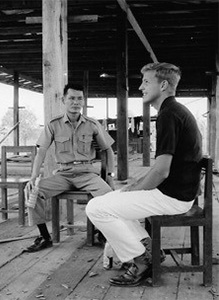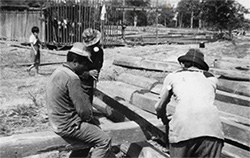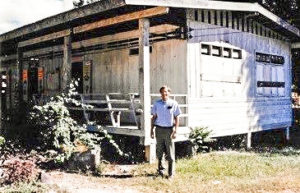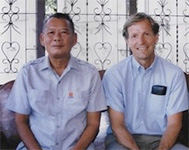Paul Strasburg — “A life-changing lunch in Thailand”
How a young Peace Corps Volunteer’s chance encounter with a teacher in Thailand in 1966 touched over a million lives.
Thousand Currents
By Bilen Mesfin
Peace Corps’ Passport Blog
ONE HOT DAY in 1965, Paul Strasburg (Thailand 1964-66) was having lunch with his Thai counterparts near the village of Ban Nong Boa.

Paul Strasburg sitting with Boonthom Boonprasert, founder and first headmaster of the school, on the school’s floor as it was being constructed in Thailand in 1966. Photos are courtesy of Paul Strasburg.
A man in a civil service uniform approached the table. The man introduced himself as a teacher and told them his story.
With no school, Boonthom Boonprasert was teaching his students outside. When it rained, school would be canceled. Cautiously and respectfully, Boonprasert asked Strasburg, then a young Peace Corps Volunteer, and his Thai colleagues: Could they help him build a school?
Strasburg’s colleagues turned to him.“You are the American,” they said. “You guys have all the money.”

Community volunteers cutting posts for the building from logs felled in a nearby forest.
In what would prove to be a pivotal moment, Strasburg agreed to find out what he could do. Working through a U.S. nonprofit, he was able to connect with high school students on Long Island, New York, who took on the project as a fundraiser. In a short amount of time, the students raised $2,000 for the Thai teacher to build his school.

The school on the day it was dedicated in 1966.
“My only job was to ask questions, scope out the project, and then be responsible for doling out the money as bills came in,” Strasburg said. The community “did all the work.”
NEARLY FOUR DECADES after his Peace Corps service, Strasburg made a return visit to the village. He was surprised and gratified to see not just that the four-room school had been built, but with just that investment of $2,000, the teacher’s success had expanded beyond serving

Paul Strasburg standing outside of the original four-room schoolhouse in 1990, now the school’s library. The school’s campus has flourished and expanded considerably.
students, to spurring economic development in the community.
What was reinforced to Strasburg that day is that small can, in fact, be big. And that tenet has driven the organization he founded, International Development Exchange (IDEX), for over 30 years.
With that deep impression, Strasburg founded IDEX in 1985 on the belief in the power of small-scale, community-driven projects to combat extreme poverty and inequality in developing countries.

Boonthom Boonprasert with Paul Strasburg in 1990.
“It wasn’t my idea alone,” Strasburg said. “By the time we created an actual organization, a group of people had been formed who were deeply invested and played vital roles in getting it off the ground.”
In the beginning, IDEX was a volunteer-based program that provided financial support for initiatives and projects that originated from communities in the Global South.
From a two-room office above a bicycle shop in Palo Alto, California, Strasburg wrote to colleagues and acquaintances around the world, asking them to recommend projects for up to $1,500 in funding. Volunteers discussed the projects submitted and chose which ones to fund.
Strasburg recollects that IDEX’s first annual budget was around $17,000 and 100 percent went toward projects.
IDEX’s first funding was provided for a local leader’s idea for getting freshwater into homes on the Indonesian Island of Madura, where around 1,000 people lived without any running water. That project was funded by a Palo Alto donor.
“After a couple of years,” Strasburg said, “we needed paid staff to handle the requests, ballooning from all over.”
After five years of existence, IDEX had three full-time staff, two part-time staff and a large number of active volunteers. At an organizational retreat came what Strasburg describes as another “watershed moment.” Staff and volunteers proposed a new approach for IDEX, moving away from the project model to begin funding grassroots organizations, so that they could decide how money would be spent — from new programs to keeping the lights on.
This organizational pivot — providing long-term support for effective community organizations started by visionary local leaders, rather than projects — would become IDEX’s trademark.
Today, IDEX continues to partner with donors and funders to support Global South leaders and organizations advancing solutions to the world’s most pressing challenges around food, the economy, and climate. Since its founding, IDEX has supported more than 500 grassroots, community-led projects in 33 countries in Africa, Asia, and Latin America with multi-year, general support commitments, reaching over 1.2 million people.
Through its work, IDEX continues to demonstrate what Strasburg discovered years ago — that local solutions have global impact.
“I can’t tell you how proud I am of what IDEX is doing,” said Strasburg. “IDEX is so far ahead of where we were back in those days.”
•
Paul served in the Thai IX Peace Corps group from 1964–66, and he worked in Peace Corps training programs for Thailand in 1966 and 1967. Today, Paul has retired to a farm in western Massachusetts after working for over forty years in nonprofit organizations and New York City government. He remains an advisor, supporter, and champion of IDEX’s work.
In 2016, IDEX (International Development Exchange) changed its name to Thousand Currents.
How gratifying . It is really nice to have an act of faith tunr out so well. Peace Corp people are starters and finishers.
Thanks for the story
it goes to show you that a chance encounter when you are on the ground in the third world ca n turn up roses. mine came sitting in a Medellin, Colombia cafe and having a government official stop by and disclose the Dept. of Education had funding if i could get village teachers to teach adult ABC’s at night. i hopped on it and filled a small schoolhouse that a youngster at the time later told me had the only light bulb that the town flocked to and they began learning again to vitalize their lives.